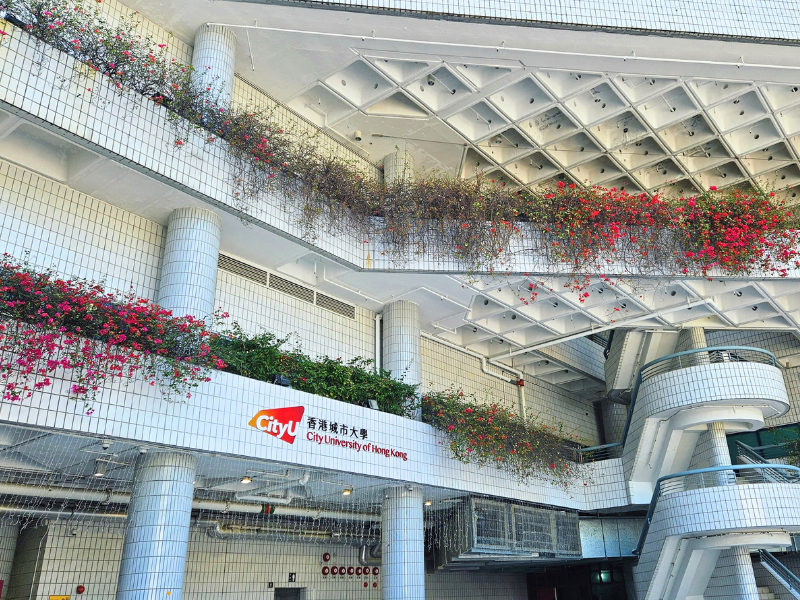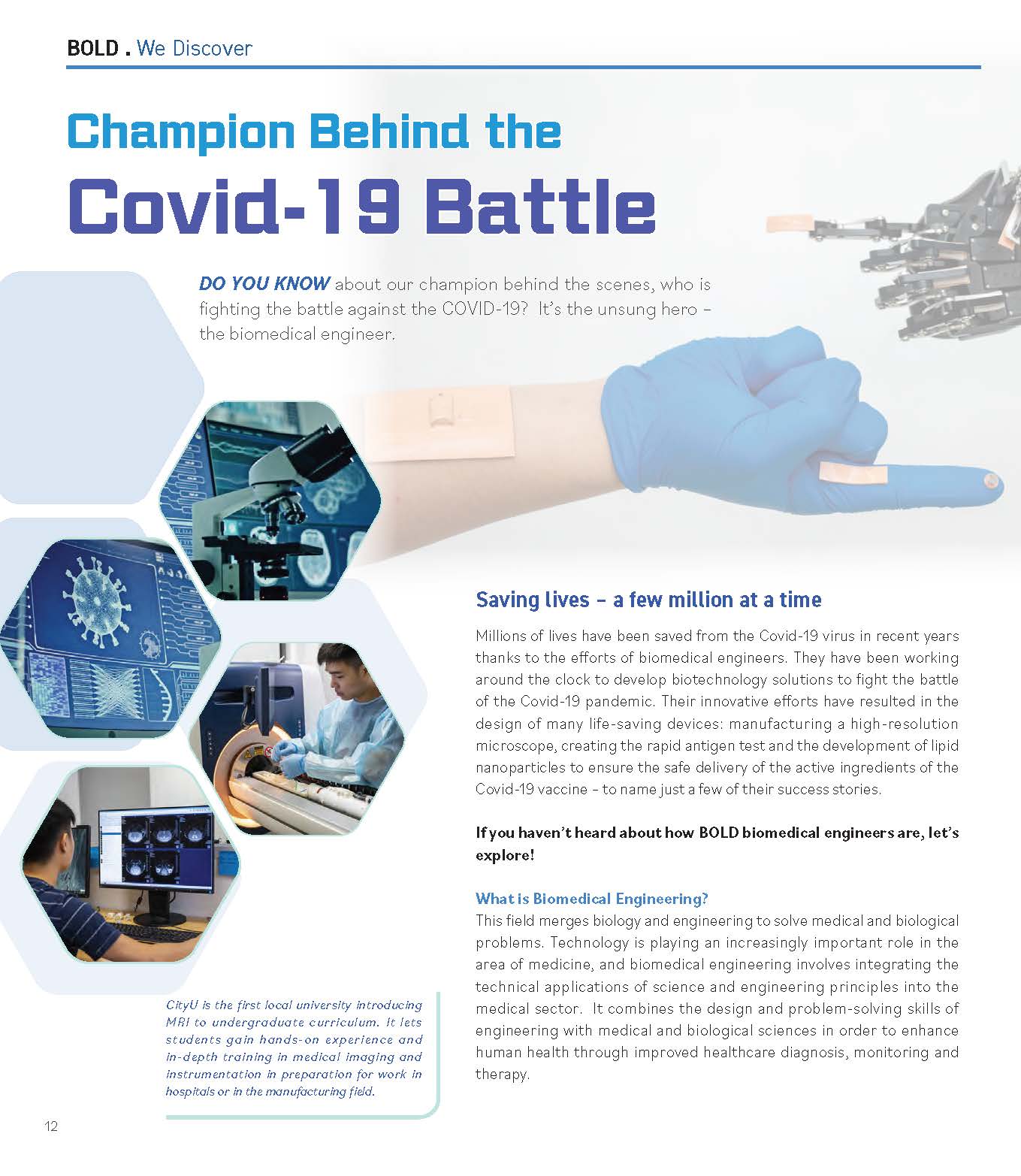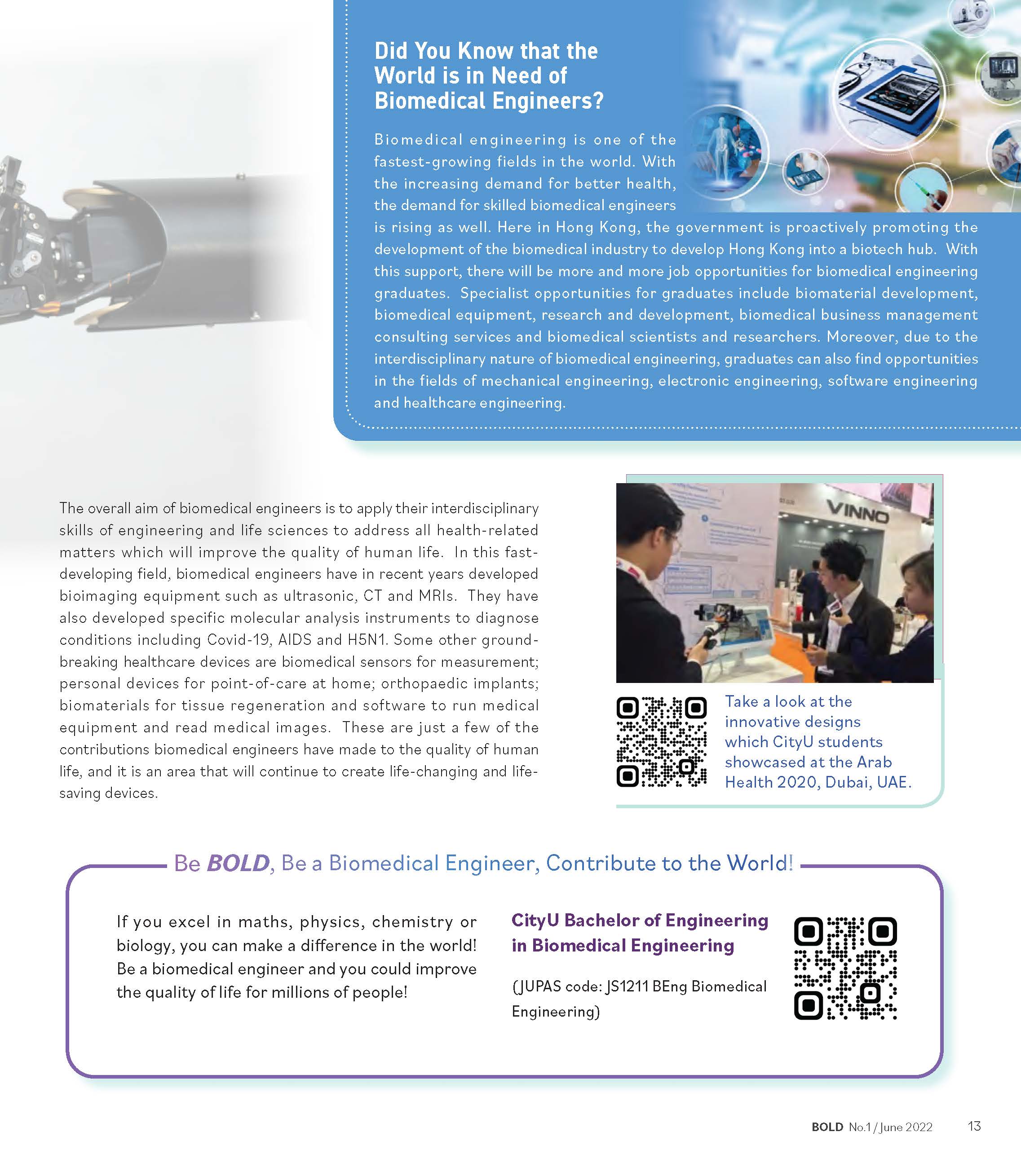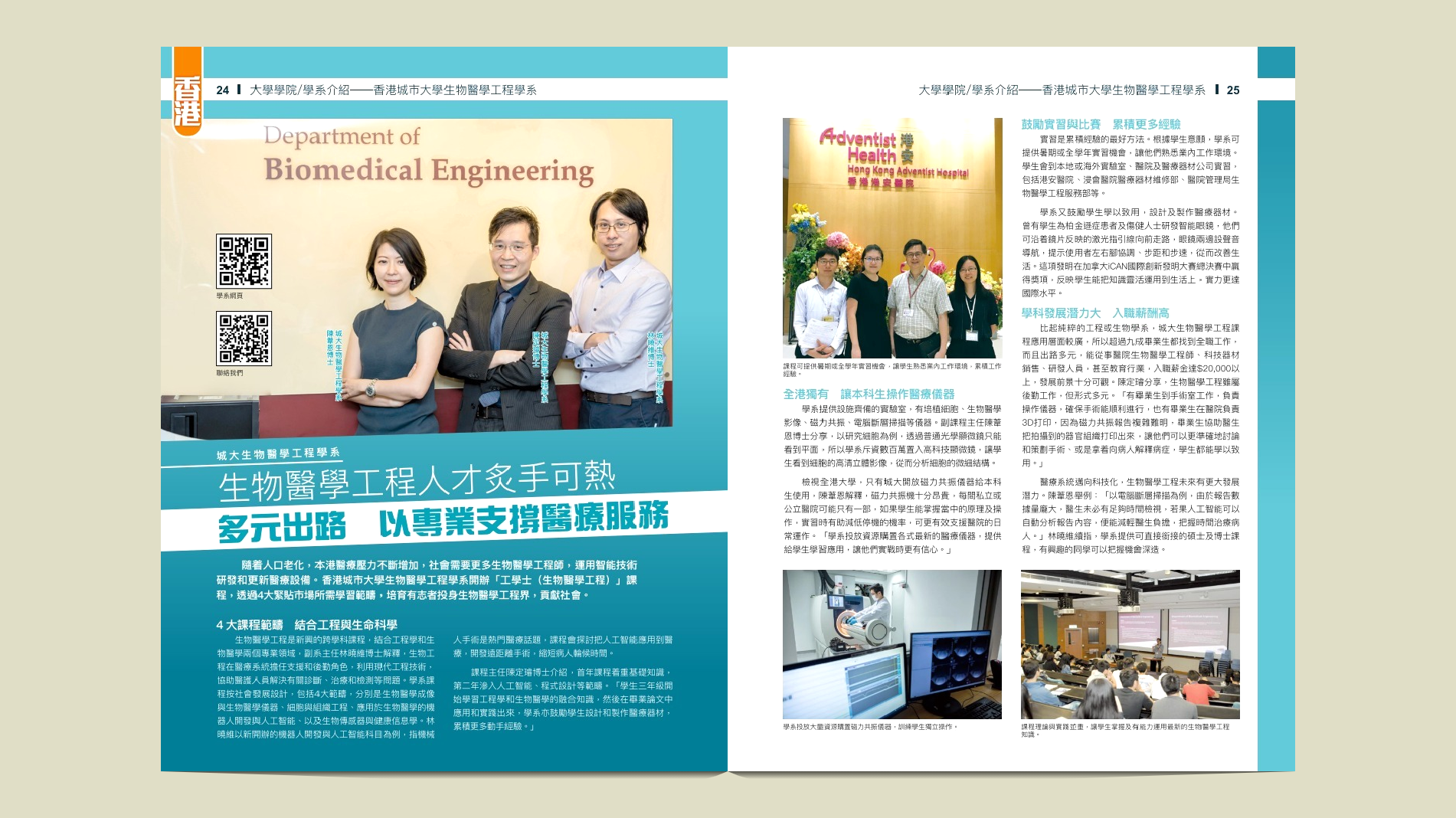BEng Biomedical Engineering (Features: Medical Technology / Bioinstrumentation / Cell and Tissue Engineering / Healthcare Robotics)

1211 (JS1211)
Local Places:
44 (For First-Year Entry; Tentative)*
Non-Local Places
(For Overall Direct Applications):
Around 400
* for JUPAS and non-JUPAS admissions
The Department of Biomedical Engineering (BME) aims to provide world-class education and to conduct research in emerging fields of engineering. To achieve these aims, the Department adopts an interdisciplinary approach and includes subject areas that ensure our graduates are equipped to meet Hong Kong's current and future needs. The Department ranked 29th in the world in the subject of biomedical engineering in the Academic Ranking of World Universities in 2022.
The Department currently offers a major in Biomedical Engineering. The Department’s faculty members have interdisciplinary backgrounds with academic strengths in areas including (a) biomedical imaging and bioinstrumentation; (b) cell/tissue engineering and biomechanics; (c) robotics and artificial intelligence for biomedical applications; and (d) biosensors and health informatics.
Please refer to the Department's website for more information about the BME Department.
生物醫學工程學系旨在提供世界級的跨學科課程和教育,以培養可綜合工程技術與生命科學從而促進人類健康的卓越人才。本學系在世界大學學術排名 (Academic Ranking of World Universities) 當中的生物醫學工程學科排名位於全球第29名。因應香港和世界各地日益增加的人才需求,本系畢業生能夠應用跨學科知識服務於多個領域,如醫療器械、醫學診斷與治療技術、醫藥開發、公共健康、食物安全、生物安全測量、以及各類與生物醫學工程技術有關的行業。學系課程按社會發展設計,包括4大範疇,分別是生物醫學成像與生物醫學儀器、細胞與組織工程、應用於生物醫學的機器人開發與人工智能、以及生物傳感器與健康信息學。
Healthcare is one of the fastest-developing fields. Air and chemical pollution in modern city, fast spreading of infectious diseases, cancer, aging-related obesity, diabetes, and Alzheimer disease, all impose enormous pressure threating our health and quality of life. However, because of many challenges ahead in this dynamic field, it requires a discipline which can integrate the knowledge of engineering and life sciences at the intersection for medical solutions and innovations.
Hong Kong government clearly identifies medical and testing/certification services being among the six industries which Hong Kong has clear advantages for further development. Considerable amount of job opportunities will be created locally and globally. Aligned with this, Biomedical Engineering will serve to educate the future professionals, ultimately positioning Hong Kong to become a major centre in the following areas:
- New biomedical devices for diseases diagnosis, monitoring, surveillance, and therapeutic treatment
- Food safety and bio-security
- New drug discovery
This major aims to pursue excellence in education, research and innovation through the fusion of engineering with life sciences for the advancement of human health. The objectives of the major are to provide integrative educational opportunities that allow students to learn passionately, think critically and independently and innovate creatively so that they are:
- able to apply their skills to a variety of challenges in their chosen field;
- equipped with the spirit of innovation, creativity, adaptability and critical thinking to solve problems in biomedical engineering-related professions;
- able to function effectively in multidisciplinary team environments and communicate with a variety of audiences;
- able to demonstrate competency in their chosen fields, and make decisions that are socially and ethically responsible; and
- able to build and expand upon their undergraduate foundations by engaging in learning opportunities throughout their careers.
As a graduate, you will find career opportunities in the medical device industry, engineering services in hospitals, consultation for public health, regulation and management in government departments and laboratories, and research and development in the commercial and educational sectors. Alternatively, you might choose to pursue postgraduate studies locally or overseas. This major will provide you with the expertise required to meet the needs of increasing public concern and demands on medical diagnostics and therapeutic treatments, biomedical instruments, food safety and quality, advancement in pharmaceutical and health maintenance products, as well as an awareness of human health and wellness.
JUPAS Entrance Requirements
| JS1211 BEng Biomedical Engineering (Features: Medical Technology / Bioinstrumentation / Cell and Tissue Engineering / Healthcare Robotics) | |
| HKDSE Subject | Minimum Level Required |
| English Language | Level 3 |
| Chinese Language | Level 3 |
| Mathematics | Level 2 |
| Citizenship and Social Development | Attained |
| Elective 1 | Level 3 in one elective subject from: - Biology - Chemistry - Physics |
| Elective 2 | Level 3 |
Notes:
- Besides Category A elective subjects, Mathematics extended modules (M1/M2) and “other languages” can also be used to meet the elective requirement. If students take both M1 and M2, they are counted as one subject only.
- Applied Learning subjects are not counted as elective subjects.
- For details of the alternative Chinese Language qualifications acceptable by the University for Non-Chinese Speaking (NCS) students, please click here.
Direct/ Non-JUPAS Applicants Entrance Requirements
To be considered for admission, you must satisfy the General Entrance Requirements. Applicants are also expected to have a science or engineering background.
Local applicants with HKDSE English Language below Level 3 are required to have a minimum TOEFL score of 550 (paper-based test) or 79 (Internet-based test), an IELTS overall band score of 6.5, or equivalent.
For details of the programme’s curriculum structure, please visit the 'Undergraduate Catalogue'.
The curriculum has been categorised into four main areas:
Technical Foundation courses
Artificial Intelligence in Biomedical Engineering, Mathematics for Biomedical Engineering, Electrical Principles, Biological Thermofluids, Biomechanics, Materials for Biomedical Engineering, Electromagnetics, Engineering Graphics, Engineering Computing
Medical Devices and Systems
Medical Biotechnology in Imaging and Measurement, Biomedical Signals and Systems, Micro and Nanotechnology, Computational Biology and Bioinformatics, Biomedical Instrumentation, Bio-sensors and Bio-devices, Biomedical Systems and Control, Robotics and Machine Vision
Cell and Molecular Engineering
Cellular and Biomolecular Engineering, Cell Transport and Signalling, Tissue Engineering, Regenerative Medicine, Gene Therapy
Health and Wellness Technology
Human Quantitative Physiology, Robotic Technology in Healthcare, Bio-safety and Risk Assessment, Technology for Drug Discovery, Radiotherapy Physics
The University and the Department offer work placement opportunities through various internship schemes, which provide students with full-time job attachments not only in Hong Kong hospitals and firms, but also in those of the Pearl River Delta region and overseas. Through such placements, students will:
- gain solid experience in real-world work environments;
- develop problem-solving abilities and interpersonal skills;
- learn the right attitudes towards work and professionalism; and
- broaden their experience and enhance their employability.
Students in the department can also opt for technical final year projects offered by companies, under the joint supervision of a BME faculty member and a company mentor.
The University offers a number of credit-bearing exchange programmes for students with various partner institutions all around the world. Through these, students can broaden their educational horizons, gain language experience and enhance their awareness of different cultures.
Please visit CityUHK's website for details of outbound exchange programmes.
This major has been granted accreditation by the Hong Kong Institution of Engineers (HKIE), a signatory member of the Washington Accord under which all members agree to recognise each other’s accredited Engineering degree programmes.
Eligible students will be invited to apply for the “Undergraduate plus Master's Degree Programme” offered by the Department. Students in an “Undergraduate plus Master's Degree Programme” will receive a conditional offer for a Master's degree programme when they join CityUHK as undergraduate students. They can benefit from higher-level courses, including those with research elements and normally taught at the postgraduate level, during their undergraduate study. They will be awarded the Bachelor of Engineering in Biomedical Engineering (BEngBME) and Master of Science in Biomedical Engineering (MSBME) degrees upon completion of the programme.
Please visit CityUHK’s website and the Department’s website for details of the Programme.
The world is currently suffering from the effects of the coronavirus disease 2019 (COVID-19) pandemic. Biomedical engineering is a major player in the fight against COVID-19, including the development of biomaterials for vaccines, devices for rapid tests, and image technology for diagnosis and treatment.
Over 400 million people in China, 31% of the population, will be over 60 years old by 2050 (www.chinadaily.com.cn). In addition, air and chemical pollution, threats to bio-security, obesity and the rapid spread of infectious diseases will continue to impose enormous pressures on the provision of trained professionals in the field of biomedical engineering.
The Hong Kong government has clearly identified medical and testing/certification services as among the six industries with clear advantages for further development. The Biomedical Engineering major will educate future professionals in these industries.
本課程旨在為香港及大中華地區培育生物醫學工程專業人才,畢業生將具備跨學科專業技術及國際視野,以應付人口老化及疾病對人類健康帶來的挑戰。



When necessary
- March to July 2025
- Individual interview
- English
When necessary